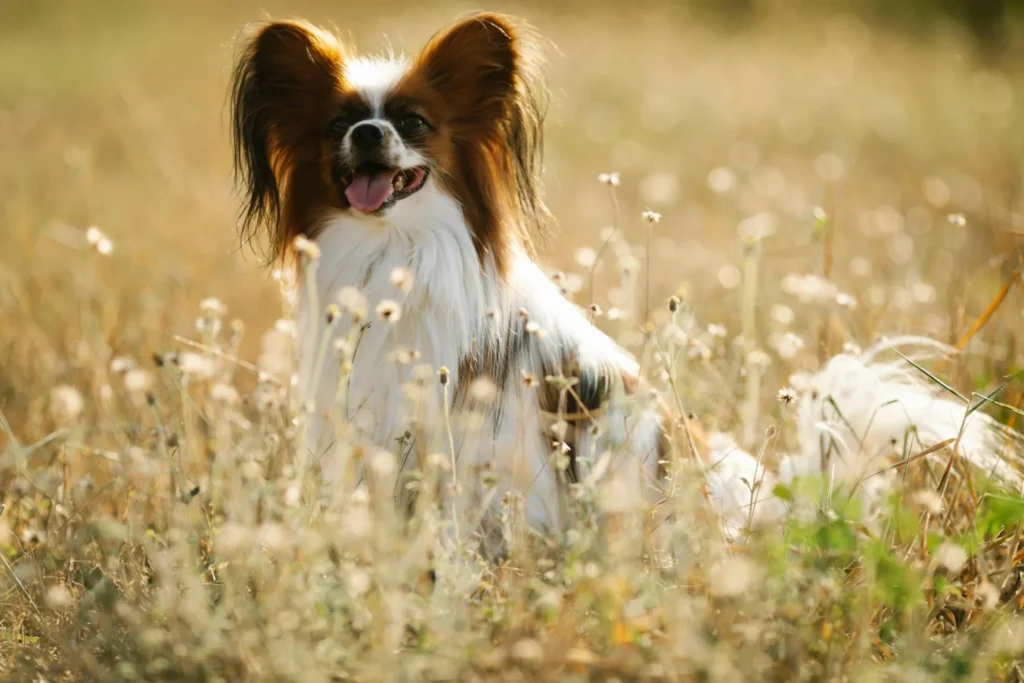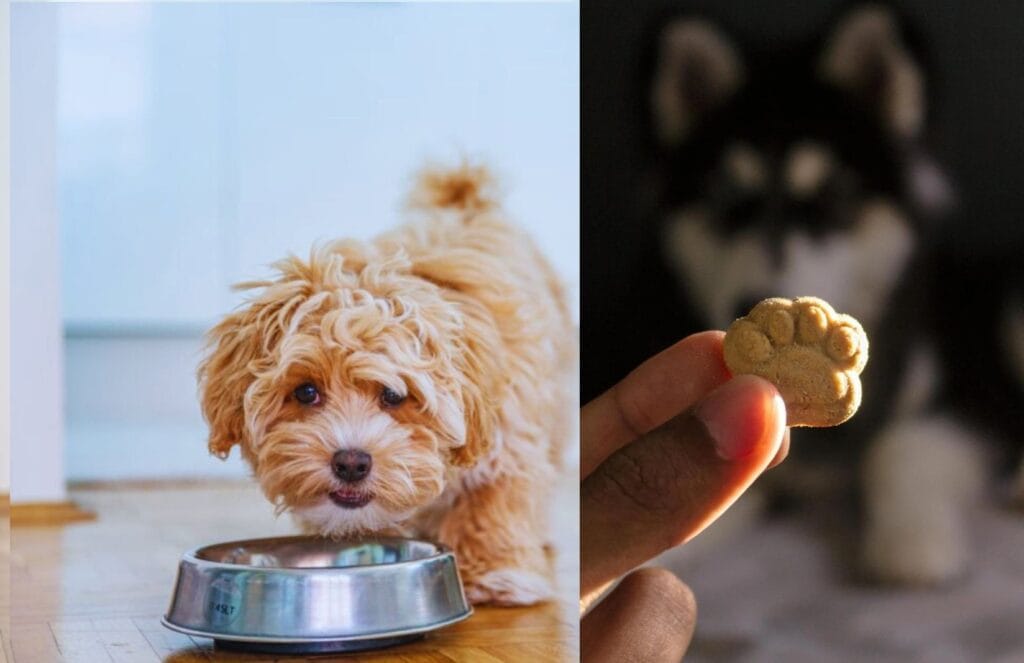Introduction: When Poodles Go Gourmet (or Garbage) 🍖🗑️
Ever caught your poodle munching on something that’d make even a goat think twice? You’re not alone! Poodles, those elegant canines with brains to match their beauty, sometimes have a taste for the truly bizarre. From grass to garbage, socks to sticks, these curly-coated connoisseurs can turn your home into an all-you-can-eat buffet of the absurd.
But why do our prim and proper poodles suddenly decide to chow down on things that’d make us humans gag? Let’s dive into the world of poodle peculiarities and uncover the mysteries behind their munching madness!
The Grass is Always Greener: Why Poodles Turn into Lawn Mowers 🌿
The Grazing Game: Reasons Behind the Green Cuisine
You’re out for a stroll, and suddenly your poodle transforms into a four-legged lawnmower. What gives? Here’s the scoop on why your pooch might be hitting the grass buffet:
- Tummy Troubles: Sometimes, a poodle’s gut instinct kicks in. If they’re feeling a bit off, they might chomp on grass to induce vomiting and clear out their system.
- Fiber Frenzy: Just like us, poodles need their roughage. Grass can provide a natural source of fiber to keep things moving smoothly in the digestive department.
- Nutrient Noshing: Your poodle might be craving certain vitamins or minerals. Grass can be a source of folic acid, a nutrient that’s essential for your pup’s well-being.
- Boredom Biting: Let’s face it, sometimes a poodle’s just gotta poodle. Grass-eating might be their way of saying, “Hey, I’m bored! Let’s play!”
- Ancestral Appetites: Wild canines often ingested plant material from their prey’s stomachs. Your poodle’s grass-eating might be a throwback to their wolfish roots.
When to Worry: Red Flags in the Green Feast
While occasional grass-munching is usually harmless, keep an eye out for these warning signs:
- Excessive grass consumption
- Vomiting or diarrhea after eating grass
- Loss of appetite for regular food
- Lethargy or other behavioral changes
If you spot these symptoms, it’s time to ring up your vet faster than your poodle can say “chlorophyll”!
Beyond the Lawn: Other Weird Things Poodles Eat 🧦🧸
Grass is just the tip of the iceberg when it comes to poodle’s peculiar palates. Let’s explore some other odd items that might end up on your poodle’s menu:
The Inedible Edibles: Common Non-Food Items Poodles Munch
- Socks and Underwear: Who needs a laundry basket when you’ve got a poodle? These fabric-loving furballs might see your socks as a tasty treat.
- Sticks and Stones: Nature’s chew toys can be irresistible, but they can also be dangerous if swallowed.
- Paper Products: From toilet paper to important documents, your poodle might decide to become a one-dog shredding service.
- Toys: Both their own and children’s toys might look like a snack to a curious poodle.
- Rocks: Some poodles develop a taste for the mineral kingdom, which can lead to serious digestive issues.
The Why Behind the Weird: Reasons for Non-Food Consumption
Understanding why your poodle’s turning your home into an all-you-can-eat buffet can help you address the root cause:
- Pica: This medical condition causes dogs to crave and eat non-food items.
- Attention-Seeking: Sometimes, your poodle might eat weird things just to get a reaction out of you.
- Anxiety or Stress: Unusual eating habits can be a sign that your poodle’s feeling uneasy.
- Nutritional Deficiencies: Your poodle might be trying to make up for something missing in their diet.
- Curiosity: Poodles are smart cookies, and sometimes they’re just exploring their world through taste.
Poodle Varieties: Does Size Matter When It Comes to Quirky Cuisine? 🐕🐩
Poodles come in three delightful sizes: Standard, Miniature, and Toy. But does their size influence their propensity for peculiar snacking? Let’s compare:
| Poodle Size | Likelihood of Eating Weird Things | Common Quirky Snacks | Potential Risks |
|---|---|---|---|
| Standard | Moderate | Socks, sticks, toys | Blockages, choking |
| Miniature | High | Small objects, insects | Choking, toxicity |
| Toy | Very High | Houseplants, crumbs, lint | Poisoning, digestive issues |
While all poodles can develop unusual eating habits, smaller poodles might be more prone to ingesting things they shouldn’t due to their size and proximity to small objects on the ground.
Age Matters: How Poodle Snacking Habits Change Over Time 👶🧓
Just like humans, poodles’ tastes and habits can change as they age. Here’s a breakdown of what to expect:
| Age Group | Typical Eating Behaviors | Weird Things They Might Eat | Prevention Tips |
|---|---|---|---|
| Puppies (0-1 year) | Curious, exploratory eating | Everything and anything | Puppy-proof your home, constant supervision |
| Adults (1-7 years) | More discerning, but still curious | Socks, garbage, outdoor items | Regular exercise, mental stimulation |
| Seniors (7+ years) | Generally less interested in non-food items | Might regress to puppy-like behaviors | Regular check-ups, adjust diet as needed |
Breed Comparison: Are Poodles the Kings of Quirky Cuisine? 👑🍽️
While poodles have their fair share of strange snacking habits, how do they stack up against other breeds? Let’s take a look:
| Breed | Likelihood of Eating Weird Things | Common Strange Snacks | Notable Quirks |
|---|---|---|---|
| Poodle | High | Grass, fabric, paper | Intelligent, may eat out of boredom |
| Labrador | Very High | Anything edible (and some things that aren’t) | Known for their insatiable appetites |
| Chihuahua | Moderate | Small objects, houseplants | May eat strange things due to anxiety |
| German Shepherd | Low to Moderate | Sticks, toys | More likely to chew than swallow |
| Beagle | High | Garbage, food scraps | Driven by their powerful sense of smell |
While poodles certainly have their quirks, they’re not alone in the world of weird eating habits!
Prevention: Keeping Your Poodle’s Palate in Check 🛑🍴
Now that we’ve explored the wild world of poodle dining, how can we keep our curly-coated companions from turning into four-legged vacuum cleaners? Here are some tips:
- Provide Mental Stimulation: A bored poodle is a mischievous poodle. Keep their brilliant brains busy with puzzle toys and training sessions.
- Regular Exercise: A tired poodle is less likely to go on a household scavenging spree. Ensure they get plenty of physical activity.
- Proper Nutrition: Feed a balanced, high-quality diet to prevent nutritional deficiencies that might lead to strange cravings.
- Poodle-Proof Your Home: Keep tempting items out of reach, especially for smaller poodles who might be closer to the ground.
- Positive Reinforcement: Reward your poodle for ignoring non-food items and choosing appropriate toys instead.
- Regular Vet Check-ups: Stay on top of your poodle’s health to catch any underlying issues that might be causing weird eating habits.
When to Call the Vet: Red Flags and Emergency Situations 🚨📞
While some quirky eating habits are harmless, others can be downright dangerous. Don’t hesitate to call your vet if you notice:
- Vomiting or diarrhea that persists for more than 24 hours
- Lethargy or loss of appetite
- Abdominal pain or bloating
- Difficulty passing stool
- Choking or difficulty breathing
- Ingestion of known toxic substances (like certain houseplants or chemicals)
Remember, it’s always better to err on the side of caution when it comes to your poodle’s health!
Conclusion: Embracing Your Poodle’s Peculiar Palate 🤗🐾
At the end of the day, poodles are as unique as they are curly. Their occasional dalliances with odd edibles are just part of what makes them such entertaining and lovable companions. By understanding the reasons behind their quirky cuisine choices, we can better care for our fabulous, fluffy friends.
So the next time you catch your poodle eyeing up a sock like it’s a gourmet meal, remember: they’re not just being weird, they’re being wonderfully, quirkily poodle-ish. And isn’t that why we love them?
FAQs: Your Burning Questions About Poodles and Their Peculiar Eating Habits 🤔💡
Q: Can eating grass harm my poodle?
A: Generally, eating small amounts of grass is harmless. However, grass treated with pesticides or herbicides can be toxic. If your poodle eats excessive amounts of grass or shows signs of illness after eating grass, consult your vet.
Q: My poodle ate my underwear! What should I do?
A: Monitor your poodle closely for signs of distress or blockage. Small items might pass naturally, but larger items could cause an obstruction. When in doubt, always consult your veterinarian.
Q: Are certain colors of poodles more likely to eat weird things?
A: There’s no scientific evidence suggesting that a poodle’s color affects their eating habits. Personality, environment, and individual quirks play a much bigger role.
Q: How can I tell if my poodle has pica?
A: If your poodle consistently and compulsively eats non-food items, especially if it interferes with their normal diet, they might have pica. A veterinary evaluation is necessary for diagnosis.
Q: Can changing my poodle’s diet help stop them from eating weird things?
A: Sometimes, yes! Ensuring your poodle gets a balanced, nutritious diet can help curb unusual cravings. Consult with your vet about the best diet for your poodle’s specific needs.
Q: My poodle only eats weird things when I’m not home. Why?
A: This could be a sign of separation anxiety. Your poodle might be seeking comfort or attention through this behavior. Consider consulting with a professional dog trainer or behaviorist.
Q: Are male or female poodles more likely to eat strange items?
A: There’s no significant difference between male and female poodles when it comes to eating unusual things. Individual personality and circumstances play a much bigger role.
Q: Can eating weird things affect my poodle’s coat quality?
A: Indirectly, yes. If your poodle is filling up on non-nutritious items, they might not be getting the nutrients they need for a healthy coat. Always ensure they’re eating a balanced diet.
Q: My poodle ate a plant. Should I be worried?
A: It depends on the plant. Some houseplants are toxic to dogs. If you’re unsure, it’s best to contact your vet or a pet poison helpline immediately.
Q: How can I teach my poodle to stop eating everything in sight?
A: Consistent training is key. Teach and reinforce the “leave it” command, provide plenty of appropriate chew toys, and ensure your poodle gets enough mental and physical stimulation.
Remember, every poodle is unique, and what works for one might not work for another. When in doubt, always consult with your veterinarian or a professional dog trainer for personalized advice. Happy poodle parenting! 🐩💖



